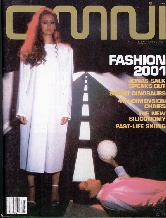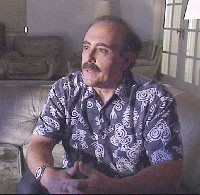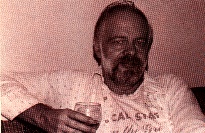Paul M. Sammon Interview
| What is BR? |
| News & Views |
| The FAQ |
| Encyclopedia |
| Quotes |
| People |
| Locations |
| Scripts |
| Analysis |
| Fan-tastic |
| BR Fun |
| BR Game |
| BR Magazine |
| BR Comic |
| Downloads |
| Collectibles |
| Related |
| Links |
| Site Info |
| Search Site |
BRmovie.com is the Home of Blade Runner - the current Blade Runner FAQ, news, resources, links, quotes, scripts and everything else Blade Runner.

![]()
Blade Runner
Buy this Mini Poster at AllPosters.com
|
Any
Comments?
Please e-mail the Webmaster |
| Want the DVD? Or the BR Game? Don't know which books or music to get? Maybe you'd like a Deckard action figure? Make sure you check the BR Related section for all your BR choices. |
|
N: There were obviously other films being made in Hollywood at the time. Why did CfQ and Omni choose to commission such in-depth "making of" Blade Runner articles, and why were you chosen for the assignment?
Cinefantastique chose me to write about BR because I'd already done a couple of cover stories for them on other movies. Therefore, Fred Clarke knew I was capable of whipping up something about BR for him. But, as I've already said, CfQ originally didn't ask me to do a Blade Runner cover story. And do you mind if I digress for a moment? It's hard to understand this in 2002, given how much slicker and shallower the magazine is now, but back in 1980, Cinefantastique was the Mount Everest of SF film magazines. In terms of intelligence and depth and critical analysis, nothing could touch it; CfQ was the genre's Film Comment. So to be involved with the publication back then was a high compliment.
So Dick's fiction had totally warped my head. And I guess Fred thought that this phildickian admiration would help give my Blade Runner article a slightly different slant from the other reportage that was bound to appear on BR. Little did we know… (laughs) N: You were witness to the Blade Runner project from a very early stage. Something you had the chance to do was to actually talk with Philip K. Dick, who of course was the author of Do Androids Dream of Electric Sheep?, Blade Runner's source novel. In "The Edge of Blade Runner" documentary, you refer to Dick as having "amphetamine psychosis" - can you expand on that?
All of which is to say that I KNOW drugs. Acid, smack, coke, weed, speed - you name it. And anyone who's been around speed long enough knows that heavy amphetamine usage results in delusional affect and feelings of persecution. Too much speed can literally eat microscopic holes in your brain, in fact. Or, at the very least, it can interfere with the normal neural firing of your brain's dendrites and axons. And Phil told me - many times - that he took a LOT of speed in the Fifties and Sixties. Mainly to help him maintain the tremendous pace at which he was writing during that period. Of course, Phil also told me that during his speed-freak phase he was pushing himself simply to support himself. He was writing all this stuff for the money. So that he could feed himself and his children and pay off the ex-wives he owed alimony to.
Again, though, I think it's important to point out that everything
I've just said pertains to the totality of Philip K. Dick,
not to the day-by-day guy I got to know during Blade Runner.
As I wrote in Future Noir, the Dick I usually interacted
with - the scholar I often talked with and interviewed over the
phone, the mentor I visited at his little apartment - was, 90% of
the time, an agreeable, uber-articulate, amazingly perceptive,
enviably educated man. He also, at least to me, was a very nice
man. Phil was nearly always accessible and charming and forthcoming
in terms of what I was about, and I was grateful for that. I also
liked him personally. So I miss him. On balance, however, I count myself as amazingly fortunate to have met and talked with such a man. Phil was truly extraordinary - and, usually, a gentleman. I really wish he were still with us. It's such a shame he never got to see Blade Runner.
|

 PS:
Well, in Omni's case, it was because their editors felt I
could do justice to Philip K. Dick and Ridley Scott, whose careers
were merging at this point. Again, I've always been a constant reader
and rabid film buff, and was already familiar with Scott and Dick's
work by 1980. So Omni must have felt that that familiarity
would allow me to knowledgeably report on a film involving both
men.
PS:
Well, in Omni's case, it was because their editors felt I
could do justice to Philip K. Dick and Ridley Scott, whose careers
were merging at this point. Again, I've always been a constant reader
and rabid film buff, and was already familiar with Scott and Dick's
work by 1980. So Omni must have felt that that familiarity
would allow me to knowledgeably report on a film involving both
men. Anyway,
another reason I was assigned to report on BR by CfQ
was because the rest of their writers were already covering something
else! I mean, if you look at the movies that were released in 1982,
it's remarkable how many of them were concerned with science fiction
and fantasy. Things like Blade Runner, of course, but also
John Carpenter's version of The Thing, Milius' Conan the
Barbarian, Schrader's Cat People remake, Tron,
Spielberg's E.T. - a veritable genre avalanche rumbled down
the mountain in 1982. And each of these projects was already being
covered by a different writer from CfQ. So I got the leftovers
- Blade Runner! (laughs)
Anyway,
another reason I was assigned to report on BR by CfQ
was because the rest of their writers were already covering something
else! I mean, if you look at the movies that were released in 1982,
it's remarkable how many of them were concerned with science fiction
and fantasy. Things like Blade Runner, of course, but also
John Carpenter's version of The Thing, Milius' Conan the
Barbarian, Schrader's Cat People remake, Tron,
Spielberg's E.T. - a veritable genre avalanche rumbled down
the mountain in 1982. And each of these projects was already being
covered by a different writer from CfQ. So I got the leftovers
- Blade Runner! (laughs) I'd
also made it known to Fred Clarke that I was knowledgeable about
Ridley Scott's film career. Of course, back in 1980, Ridley had
only done two features, Alien and The Duellists, both
of which I'd seen. But having caught them made it very easy to claim
to be a "Scott Expert"(laughs)! Most of all, though, I
emphasized the fact that I was a tremendous admirer of Philip K.
Dick. In fact, I still can recall the first time I read a short
story of his. That was back around 1961; the story was "The
Father Thing," and it made a tremendous impression on me. So
much so that it still feels like I first read that thing only 20
minutes ago!
I'd
also made it known to Fred Clarke that I was knowledgeable about
Ridley Scott's film career. Of course, back in 1980, Ridley had
only done two features, Alien and The Duellists, both
of which I'd seen. But having caught them made it very easy to claim
to be a "Scott Expert"(laughs)! Most of all, though, I
emphasized the fact that I was a tremendous admirer of Philip K.
Dick. In fact, I still can recall the first time I read a short
story of his. That was back around 1961; the story was "The
Father Thing," and it made a tremendous impression on me. So
much so that it still feels like I first read that thing only 20
minutes ago! PS:
I think what I actually said - part of my comment was edited out
of that program - was that a portion of Phil's paranoia and schizophrenia,
his absolute conviction that he'd been burglarized by the CIA or
visited by a paranormal entity, seemed, to me, symptomatic of classic
amphetamine psychosis. That hypothesis comes from a fairly informed
viewpoint: I have a degree in psychology. And on a more practical
plane, right after graduating from college, I'd youthfully rebelled
against my Catholic/armed forces/military intelligence upbringing
for a short while by spending a couple of years as a drug-gobbling
street person.
PS:
I think what I actually said - part of my comment was edited out
of that program - was that a portion of Phil's paranoia and schizophrenia,
his absolute conviction that he'd been burglarized by the CIA or
visited by a paranormal entity, seemed, to me, symptomatic of classic
amphetamine psychosis. That hypothesis comes from a fairly informed
viewpoint: I have a degree in psychology. And on a more practical
plane, right after graduating from college, I'd youthfully rebelled
against my Catholic/armed forces/military intelligence upbringing
for a short while by spending a couple of years as a drug-gobbling
street person. Anyway,
I'm certainly not judgmental about Dick's drug habits - how could
I be? Still, when you add all those years of amphetamine abuse to
the psyche of a sensitive, highly imaginative individual who also
drank and took hallucinogenics... well, let's just say that I wouldn't
be at all surprised if that individual displayed erratic behavior.
But that was another thing about Phil. He seemed to love acting
out. Loved drama. Melodrama. And, as a child, long before he ever
hit the speedway, Phil was already seeing doppelgangers standing
at his bedside. Which indicates, at least to me, that Dick was probably
mildly schizophrenic from birth. The later stresses of trying to
make a living as a writer, of trying to find his place in the world,
of the almost street-level existence he was forced to endure most
of his life...all that and Phil's drug/drink experiments only served,
in my opinion, to worsen a preexisting condition.
Anyway,
I'm certainly not judgmental about Dick's drug habits - how could
I be? Still, when you add all those years of amphetamine abuse to
the psyche of a sensitive, highly imaginative individual who also
drank and took hallucinogenics... well, let's just say that I wouldn't
be at all surprised if that individual displayed erratic behavior.
But that was another thing about Phil. He seemed to love acting
out. Loved drama. Melodrama. And, as a child, long before he ever
hit the speedway, Phil was already seeing doppelgangers standing
at his bedside. Which indicates, at least to me, that Dick was probably
mildly schizophrenic from birth. The later stresses of trying to
make a living as a writer, of trying to find his place in the world,
of the almost street-level existence he was forced to endure most
of his life...all that and Phil's drug/drink experiments only served,
in my opinion, to worsen a preexisting condition.